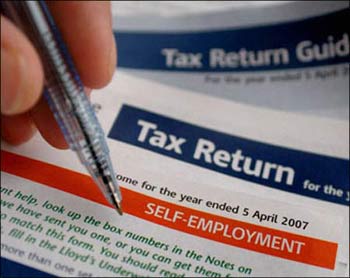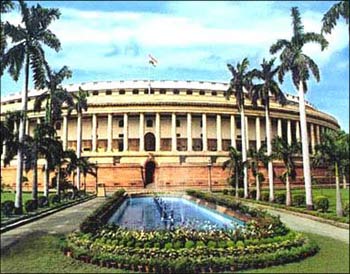Photographs: Uttam Ghosh Gautam Nayak, Outlook Money
Budget 2009 certainly disappointed the stock markets, which had unrealistic expectations. Given the constraints of finances, and the goodies already doled out in the pre-election Budget, the new Finance Minister had little left to hand out to taxpayers.
This explains the minor tinkering with the exemption limits, with the basic general exemption rising by Rs 10,000 to Rs 1,60,000 (a saving of all of Rs 1,000 in taxes), and that for women and senior citizens to Rs 1,90,000 and Rs 2,40,000, respectively.
He has, however, been more generous to high income earners, with those having annual taxable income above Rs 10 lakh saving 10 per cent of their taxes (amounting to at least Rs 22,660) on account of the surcharge abolition.
How Budget will hurt taxpayers and growth
Image: FBT removal to benefit only employers.Photographs: Rediff Archives
Pro-employer FBT move
Abolition of fringe benefit tax (FBT) will benefit employers more than employees, as the procedural compliances would reduce. Most of the employee benefits provided by employers would now be taxable in the hands of employees, and at substantially higher rates.
One would have to await the amended rules to see what benefits are finally taxed and at what value. Stock options would certainly be taxed now in the hands of employees as there is no exemption as was available prior to the introduction of FBT.
The tax on stock options would be on the value of the benefit derived at the time of exercise of the option, and levied at the time of exercise, resulting in a tax outflow even if the shares have not been sold.
Contributions by employers to superannuation funds in excess of Rs 1 lakh would also be taxed as perquisites, though amounts received from superannuation funds as pension would also be taxable in the hands of retired employees (resulting in double taxation).
Employers would need to rework employee salary and benefit packages to minimise tax costs once the amended perquisite rules are notified.
How Budget will hurt taxpayers and growth
Image: The Budget seeks to tax even gifts received in kind in the form of specified assets.Photographs: Reuters
Unkind cut: gift taxation
Most budgets have at least one dangerous provision, rarely mentioned in the finance minister's speech. This Budget is no exception -- the deadly provision relating to taxation of gifts and deemed gifts is likely to have serious implications for many.
Till now, only gifts of money received from non-relatives were taxable as income of the recipient if the total value of such gifts received in a year by a person exceeded Rs 50,000.
The Budget seeks to tax even gifts received in kind in the form of specified assets (namely immovable property, shares and securities, jewellery, drawings, sculptures, paintings, archaeological collections and works of art) if the value of such gifts exceeds Rs 50,000.
The worst part of this amendment is that it seeks to incorporate the concept of a deemed gift. If a person buys any such immovable or movable property at a price lower than its fair market value (based on stamp duty valuation or rules to be prescribed) by more than Rs 50,000, it will be assumed that he has received a gift, which will be taxed as a regular income.
How Budget will hurt taxpayers and growth
Image: How can a person be taxed on something that he has not really earned?Photographs: Rediff Archives
Imperfect view
This provision reveals the flawed mindset of the tax authorities, who believe that our country has perfect markets, which even the United States lacks.
It is well known that the market prices of artworks often fluctuate to a great extent over time and across markets.
A work of art bought in an open auction would generally cost more than one purchased from an art gallery, which, in turn, would cost more than one purchased directly from an artist. Often, an immovable property or an artwork is acquired at a distress price on account of urgent need for funds by the seller.
Adjacent flats in a building rarely sell at the same price. In such situations, it is senseless to tax the buyer on the basis of certain assumed valuation norms, just because he has got the artwork or property at a bargain price.
One also needs to keep in mind that valuation of an asset is always subjective, depending on individual perception and need felt for the asset. This subjectivity would effectively provide room for discretionary valuation of property by tax officers.
It is likely that the value of almost every purchase of such types of properties will be challenged by tax officers, leading to unnecessary litigation.
How can a person be taxed on something that he has not really earned? Given the short run-up to the Budget, it is possible that the FM may not have fully understood the far-reaching implications of this provision.
This is one provision that he should certainly relook, given the potential for its misuse.
How Budget will hurt taxpayers and growth
Image: Another misconceived provision is the one relating to exemption for VRS.Photographs: Rediff Archives
VRS vagaries
Another misconceived provision is the one relating to exemption for VRS (voluntary retirement scheme) compensation and relief under Section 89. While an exemption of up to Rs 5 lakh is available for VRS compensation, its taxable component qualified for the spread-over relief under Section 89.
In a mistaken belief that employees are receiving a double benefit, they are now being given a choice of selecting only any one of the two benefits for such VRS compensation.
Presumptuous
The new presumptive scheme for small businesses having turnover or receipts of less than Rs 40 lakh seems attractive, but will be available only from the accounting year 2010-11.
Further, small retailers would be worse off under this scheme, with their income being presumed at 8 per cent of turnover as against 5 per cent of turnover under the current scheme. Obviously, tax authorities believe their profitability has improved, notwithstanding the economic slowdown.
How Budget will hurt taxpayers and growth
Image: The Indian Parliament building in New Delhi.Photographs: Rediff Archives
Get PAN right
Employees and investors now need to ensure that they have a PAN (Permanent Account Number) and that it is recorded correctly by their employer and by the investee company/bank in all their investments.
Amendments in TDS (tax deduction at source) provisions provide that if the PAN of a person to whom income is being paid is not available or is incorrect, instead of the appropriate rate of TDS, a higher rate of 20 per cent would apply from 1 April 2010.
Investment taxation does not have many other changes. Zero coupon bonds issued by nationalised banks have also now been given the benefit of the discount on such bonds being taxed as capital gains at 10 per cent (in case of long-term assets), instead of being taxed as interest at normal tax rates.
How Budget will hurt taxpayers and growth
Image: As the new direct taxes code is on the anvil, one wonders whether there was any need for so many tax law amendments.Photographs: Reuters
Equity edge holds
Given this investment scenario, equities continue to be attractive investments from the tax perspective due to the exemptions for dividends and long-term capital gains on stock market sales.
Zero coupon bonds offer a more tax-efficient manner of investment in long-term debt instruments, as compared to other interest-bearing investments.
Public Provident Fund continues to be an extremely attractive long-term investment, with tax deduction for the investment and tax-free returns of 8 per cent.
Finally, as the new direct taxes code is on the anvil, one wonders whether there was any need for so many tax law amendments. Perhaps, old habits die hard, and the FM cannot imagine a Budget without direct tax amendments.
The author is a member, Bombay Chartered Accountants Society (BCAS) and partner, Contractor, Nayak & Kishnadwala, Chartered Accountants.









article